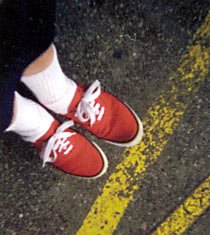As you enter the garret, opening the door to the last stretch of stairs, the first thing you see on the landing is an antique side table. It is dark wood, clearly from “yore,” the only period of furniture manufacture that you are familiar with other than “present day.” It has three open shelves: a top shelf, a middle shelf, and a bottom shelf. On it are porcelain figurines, a vase with silk flowers, a painted wooden horse and a statuette of a ballerina; general knick-knacks, your treasures. Two of the porcelain figurines are Royal Doulton, a balloon woman and a shepherdess, and one is a Hummel, a young girl with braids that are flying in the pretend breeze. Up front, so they won’t be dwarfed by the larger items, you see a tiny lady in a red dress who has lost her arm (which lies next to her on the shelf), a miniature cupboard, and a tiny brown and white dog (some sort of Spaniel?). When you pick her up in your hand, you see where she was crudely glued together, possibly by a child using Elmer’s all-purpose school glue. All three pieces fit easily in your adult-size palm. The rhyme comes to mind, “Old Mother Hubbard went to the cupboard, to fetch her poor dog a bone…” This English woman does not look old—her cheeks are rosy and her hair is brown. She is wearing one of those hats that looks like a white shower cap (the kind Betsy Ross used to wear in the history books). Her dog does not look emaciated. The cupboard is not bare. Instead, it painted green with orange embellishments. The shelves hold plates and bowls, perhaps a fat pitcher on the second shelf. Apparently the maker of this porcelain trio was not hoping for literary accuracy. This woman has traveled with you from Germany to Honduras to Maryland to Pittsburgh. She might have gone to Poland. You can’t remember. Your father does not remember giving it to you, though you know he did, when you were living in Germany. You were five or six. Maybe seven. When you called him earlier today, after your lunch at a nearby bistro, to ask him about it, he said, “That sounds like something I would buy.” Your mother remembered the set. “There’s a little dog?” There is no marking to indicate who made the set, and on closer inspection of the cupboard (the only object large enough to carry a such a marking if one were one) you see that it has been mended too. Only the dog bears no such scars. He was lost for a few years, though. You remember when you moved back to Pittsburgh after college being aghast that you couldn’t find him. Your roommate assured you that finding a miniature porcelain dog couldn’t be too hard. You never got around to looking for a replacement, though, and years later, you were ecstatic when you found him again. You walk towards the kitchen to look for Super Glue, but pause, wondering if the arm will stay attached while the glue is drying, gravity being what it is. You imagine a little bed made of tissue paper, stiff enough to hold the woman on her side while her arm heals.
Apparently you do not have Super Glue. You ransacked your junk drawer, where you used to keep the glue, years ago. You found books and books of matches, a packet of flower preserver powder, plastic spoons and forks and knives encased in plastic with matching napkins. So. Old Mother Hubbard remains armless. It is the arm that would be reaching to open the cupboard door.
The nursery rhyme has fourteen verses. You remember this trivial fact because you did a paper on a chapbook version of it for your History of Children’s Literature class in grad school. You double check in your red copy of “The Annotated Mother Goose.” You tried to incorporate your miniature porcelain set into the text of the paper, but couldn’t make it work. You tried to find that paper this afternoon, as another procrastination (you prefer to call it research) method. You called your best friend in Boston, hoping to read her what you had written so far, but you had forgotten that it was her son’s ninth birthday. You talk for a few minutes, letting her go to finish coordinating her son’s favorite meal for supper. You return to the porcelain set, and the broken arm. With the unbroken arm, which is her right arm, Mother Hubbard is holding her skirt, ostensibly to keep it from dragging on the floor, but it makes her appear as if she is about to dance off somewhere, and instead of her broken arm reaching for the cupboard, she is really reaching to put her arm on Father Hubbard’s shoulder. But Father Hubbard is never mentioned in the verses. Was Mother Hubbard a widow? Children are never mentioned either, only the dog. Was she one of those crazy cat women that call her cats her children except she had dogs and in actuality, only the one? You realize that all this wondering has caused you to creep onto the top of a second page and wonder if you should go back and crop some of the earlier paragraphs, or, continue until you have at least another half side covered, so as to legitimately account for the use of a second side of paper. You wonder if there really is anything interesting about your little figurines to anyone but you. You go back to the top of the screen, re-reading what you have written so far.
You come back to where you left off, and click on the “Print Preview.” You have managed to write another quarter of a page. Can you possibly write enough so that it is a page and a half? That seems like less of a waste of paper than a page and a quarter, although you will be using more ink. Did Dickens think of page inches? His books were long, to be sure, but they were first published in serial format in magazines. You don’t own any Dickens to leaf through to see what length his chapters were. You realize this isn’t really the point, more or less, but does the piece say anything significant? Does it break your heart, for instance, or make you angry, or do you see the woman sitting in the corner nodding off as you read your pages aloud on Monday evening? You sigh, thinking it is almost time to get ready to go to church. You still have time tomorrow to tweak, to edit, to re-write. “All writing is re-writing,” you hear an old writing teacher drone inside your head. You bet you’ve reached the one and one half page mark by now. You wonder how many words that is. You click into “Tools” and find “Word Count.” Hmm. You have written two pages, one thousand one hundred fifty eight words, which translates into five thousand one hundred thirty seven characters, in four paragraphs, taking up seventy-seven lines. You look at the clock and decide that what you really want to do now is get to church early so you can hear the band practicing.
(I got there early enough to have a bowl of pizza soup and pray with the worship team.) (We also had our first congregational meeting. Growing pains for our tiny brand new baby church, lemme tell you! But there's no church I'd rather be a part of, anywhere.)
3 years ago


2 comments:
hmmm, still intrigued.
pictures would be good.
When I tried to take pictures, I couldn't get her in focus. I may need to read the manual...gah!
Post a Comment